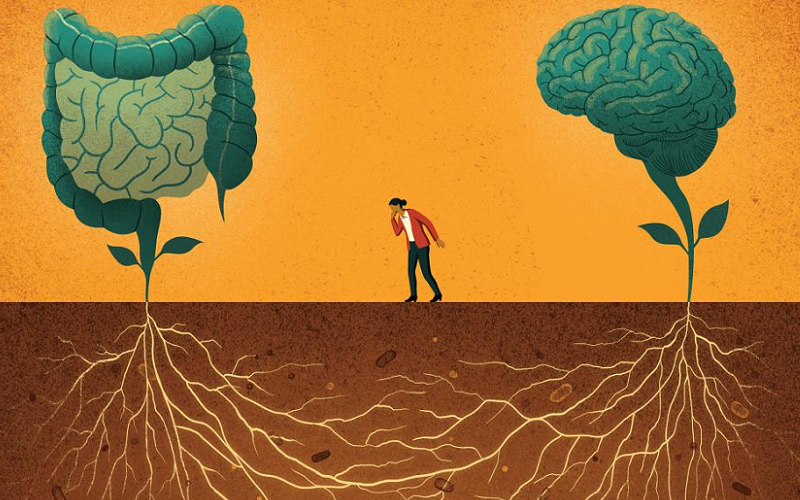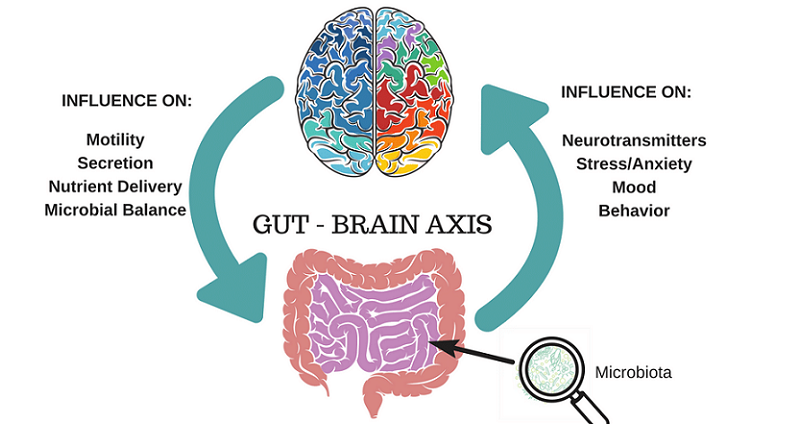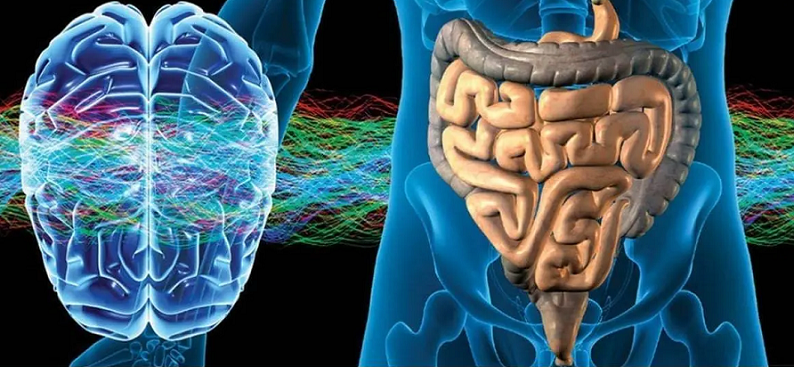
In the intricate dance of health and disease, the gut microbiota emerges as an unexpected yet pivotal player in maintaining and influencing brain health. This complex community of microorganisms, residing in our digestive tract, has proven to exert a profound impact on our cognitive functions, emotional well-being, and susceptibility to neurological disorders. Here we examine the mechanisms through which the gut microbiota communicates with the brain, the impact of microbial diversity on cognitive and emotional health, and the factors that influence the composition of our gut microbiota.
Contents
Introduction to Gut Microbiota
In recent years, the scientific community has turned its focus toward understanding the myriad ways in which the gut microbiota influences overall health, uncovering its significant impact on brain function and mental well-being. This complex ecosystem, comprising trillions of microorganisms including bacteria, viruses, fungi, and protozoa, resides within the human gastrointestinal tract.
Its composition and diversity are as unique as fingerprints, varying significantly from one individual to another. The exploration of gut microbiota has led to groundbreaking insights, revealing a bi-directional communication network with the brain, aptly named the gut-brain axis. This connection underscores a fascinating relationship that goes far beyond digestion, encompassing emotional regulation, cognitive processes, and even the predisposition to neurological conditions.
Definition of Gut Microbiota
Before delving deeper into the intricacies of how gut microbiota influences brain health, it’s essential to establish a foundational understanding of what gut microbiota entails. Essentially, it encompasses the vast array of microorganisms living in our digestive tracts. These microscopic inhabitants play crucial roles in nutrient absorption, immune system function, and the synthesis of vitamins and neurotransmitters.
Overview of Brain Health
Brain health refers to the optimal functioning of cognitive abilities, including memory, learning, attention, and problem-solving skills. It also encompasses emotional stability and resilience against mental health challenges such as anxiety and depression. The state of our brain health is influenced by a multitude of factors, including genetics, lifestyle choices, and increasingly, as research suggests, the condition of our gut microbiota.
Connection Between Gut Microbiota and Brain Health
The connection between the gut and the brain, known as the gut-brain axis, is a complex, bi-directional communication system that links the emotional and cognitive centers of the brain with peripheral intestinal functions. This relationship suggests that the state of our gut microbiota can directly and indirectly influence our brain health, affecting everything from our mood to our susceptibility to neurodegenerative diseases. Understanding this connection opens new avenues for therapeutic interventions aimed at improving brain health by modulating the gut microbiota [1].

The Gut-Brain Axis
At the heart of the relationship between our gut microbiota and brain health lies the gut-brain axis, a complex network that facilitates communication between the gastrointestinal tract and the central nervous system. This communication pathway is not only revolutionary in our understanding of mental and neurological health but also suggests that the gut microbiota can influence our brain’s structure and function.
Explanation of the Gut-Brain Axis
The gut-brain axis encompasses various physical and chemical connections, including the central nervous system (CNS), the enteric nervous system (ENS), and the endocrine (hormonal) systems. This intricate network allows for constant communication between the brain and the gut, with the gut microbiota playing a pivotal role in mediating these interactions. The presence of a diverse and balanced gut microbiota is crucial for the proper functioning of this axis, influencing everything from our stress response to our decision-making processes.
Communication Pathways
The communication between the gut and the brain occurs through several pathways, each playing a unique role in maintaining brain health and emotional well-being.
Vagal Pathways
The vagus nerve, one of the largest nerve systems connecting the brain and the gut, acts as a critical communication highway. Signals from the gut microbiota can influence brain function through the vagus nerve, affecting mood, stress levels, and overall brain health. For instance, certain strains of probiotics have been shown to reduce stress-induced behavior and anxiety through their action on the vagal pathways [2].
Immune System Mediation
The gut microbiota also communicates with the brain through the immune system. Microbial imbalances in the gut can lead to an overactive immune response, resulting in inflammation that may affect the brain. This inflammation has been linked to several neurological conditions, including depression and Alzheimer’s disease.
Enteric Nervous System
Often referred to as the “second brain,” the enteric nervous system (ENS) within the gut wall contains hundreds of millions of neurons that can operate independently of the CNS but are influenced by the gut microbiota. The ENS plays a role in regulating gut motility and secretion and can send signals to the brain that affect mood and behavior.
Role of Neurotransmitters and Hormones
Neurotransmitters and hormones serve as chemical messengers in the gut-brain axis, with the gut microbiota influencing their production and regulation. For example, a significant portion of the body’s serotonin, a neurotransmitter crucial for mood regulation, is produced in the gut. Dysbiosis, or an imbalance in gut microbiota, can lead to altered neurotransmitter levels, affecting emotional well-being and cognitive functions.
Impact of Gut Microbiota Diversity on Brain Health
The diversity of the gut microbiota stands as a central pillar in the quest to understand its impact on brain health. A rich and varied microbiome is associated with a robust gut-brain axis, facilitating optimal communication between the gastrointestinal tract and the central nervous system.
Cognitive Functions
A diverse gut microbiota contributes significantly to cognitive functions, including memory and learning. Research indicates that certain gut bacteria can produce compounds that act as neurotransmitters, influencing neural pathways associated with cognitive processes [3].
Memory
Studies have shown that alterations in the gut microbiota can affect memory performance. For instance, certain probiotics that influence the balance of gut bacteria have been linked to improved memory in both animal and human studies. This suggests that the gut microbiota can influence brain function directly by producing substances that affect neural processes related to memory.
Learning
Similarly, learning capabilities can be influenced by the state of the gut microbiota. Experiments with rodents have demonstrated that those with a more diverse gut microbiota exhibit better learning abilities compared to those with a less diverse microbial composition. The mechanisms behind this observation may involve the production of short-chain fatty acids by gut bacteria, which have been shown to possess anti-inflammatory properties and promote brain health.
Emotional Well-being
The diversity of gut microbiota also plays a crucial role in emotional well-being, influencing stress responses and the likelihood of experiencing anxiety and depression.
Stress Response
The gut microbiota can modulate the body’s stress response by influencing the hypothalamic-pituitary-adrenal (HPA) axis, a major part of the neuroendocrine system that controls reactions to stress and regulates many body processes. A balanced and diverse gut microbiota can help in maintaining a healthy HPA axis response, potentially reducing vulnerability to stress.
Anxiety and Depression
Emerging research suggests a link between gut microbiota diversity and the risk of anxiety and depression. Certain microbial strains have been found to produce or stimulate the production of neurotransmitters, such as serotonin and gamma-aminobutyric acid (GABA), which play key roles in mood regulation. A diverse microbiome may enhance the production of these neurotransmitters, offering protective effects against mood disorders.
Neurological Disorders
Finally, the diversity of gut microbiota is linked to the risk of developing neurological disorders, including Alzheimer’s disease, Parkinson’s disease, and multiple sclerosis.
Alzheimer’s Disease
Emerging evidence suggests that gut microbiota may influence the development and progression of Alzheimer’s disease. Studies have found differences in the gut microbiota composition of individuals with Alzheimer’s compared to healthy controls, indicating that microbial diversity could impact the disease’s pathophysiology [4].
Parkinson’s Disease
Similar associations have been observed with Parkinson’s disease, where alterations in gut microbiota composition are linked to the severity of symptoms. The gut-brain axis may play a role in the aggregation of alpha-synuclein, a protein associated with the development of Parkinson’s.
Multiple Sclerosis
In multiple sclerosis, research has highlighted the potential role of gut microbiota in modulating the immune system’s response. A diverse gut microbiota may help regulate immune functions and reduce inflammation, potentially influencing the disease’s course.

Factors Influencing Gut Microbiota Diversity
The diversity of the gut microbiota is not static; it is influenced by a variety of factors throughout our lives, from the food we eat to the environment we live in. Understanding these factors is crucial for anyone looking to improve their brain health through gut health.
Diet and Nutrition
Diet plays a pivotal role in shaping the gut microbiota, with certain foods promoting diversity while others may contribute to dysbiosis, an imbalance in microbial populations.
Prebiotics and Probiotics
Prebiotics, which are fibers that feed beneficial bacteria, and probiotics, which are live beneficial bacteria, are essential for maintaining a diverse and healthy gut microbiota. Foods rich in prebiotics include garlic, onions, asparagus, and bananas, while probiotics are found in fermented foods like yogurt, kefir, sauerkraut, and kimchi. Incorporating a variety of these foods into the diet can help enhance microbial diversity and, by extension, support brain health.
Fiber-Rich Foods
A diet high in fiber from fruits, vegetables, legumes, and whole grains supports the growth of beneficial gut bacteria. Fiber acts as a prebiotic, providing the necessary nutrients for these bacteria to thrive. A diverse diet rich in plant-based foods can increase microbial diversity, promoting better gut and brain health [5].
Antibiotics and Medications
While antibiotics are crucial for fighting bacterial infections, their overuse or misuse can significantly impact the diversity of the gut microbiota. Antibiotics can indiscriminately kill both harmful and beneficial bacteria, leading to reduced diversity and imbalances that may affect brain health. Other medications, including non-steroidal anti-inflammatory drugs (NSAIDs) and proton pump inhibitors (PPIs), can also affect microbial diversity.
Lifestyle Factors
Beyond diet and medications, several lifestyle factors can influence the diversity of the gut microbiota, impacting overall health and well-being.
Exercise
Regular physical activity has been shown to positively affect gut microbiota diversity. Exercise promotes the growth of beneficial bacterial species that can have anti-inflammatory effects and improve metabolic health, which in turn supports brain health.
Stress Management
Chronic stress can negatively impact gut microbiota diversity, leading to imbalances that may affect the brain. Stress management techniques such as mindfulness, meditation, and yoga can help mitigate these effects, supporting a healthier gut-brain axis.
References
[1] Association of the Gut Microbiota With Cognitive Function in Midlife
[2] Gut microbiome composition and diversity are related to human personality traits
[3] A systematic review exploring the association between the human gut microbiota and brain connectivity in health and disease
[4] Gut biodiversity and its influence in brain health
[5] Gut microbiome, cognitive function and brain structure: a multi-omics integration analysis

